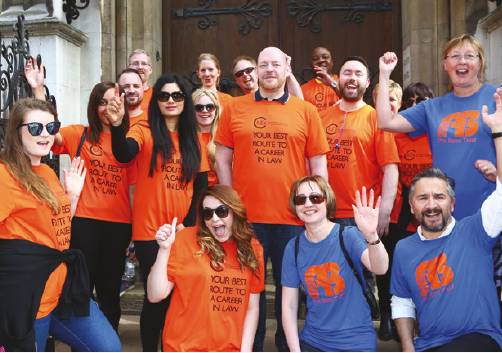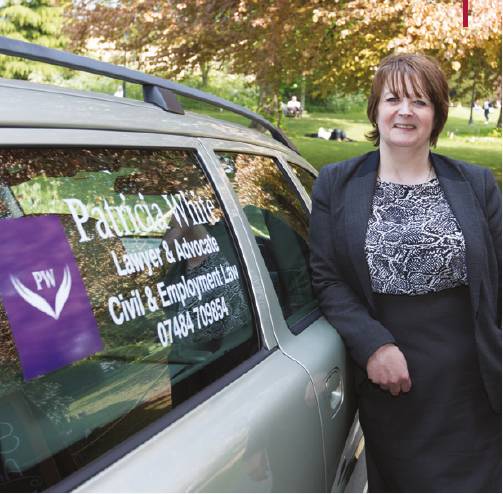myCILEx
Welcome to myCILEx
CILEx’s exclusive members area
myCILEx provides you with information on the work CILEx is doing on behalf of its members.
For the latest branch events in your area, visit: www.cilexbranches.org.uk
NOTICE IS GIVEN that the ANNUAL GENERAL MEETING of The Chartered Institute of Legal Executives will be held at 3.30 pm, on Thursday 13 July 2017, at Novotel London Tower Bridge Hotel, 10 Pepys Street, London EC3N 2NR.
Anyone who is registered with The Chartered Institute of Legal Executives (CILEx) may attend the Annual General Meeting and speak on the various items of business, but only Fellows are entitled to vote on Resolutions.
.
Meet the trust: introducing the CILEx Pro Bono Trust board
Nick Hanning, chair of the CILEx Pro Bono Trust, writes:
Over the past several months, we have featured several articles about the work of the CILEx Pro Bono Trust (see for example ‘CILEx Pro Bono Survey 2016: the results are in!’, (2017) March CILExJ pp44 and 46). They generated a good deal of interest, so we thought that readers might be interested to know rather more about who is on the board of the trust and how to engage with them about the trust's current activities, its future plans, or pro bono generally.

There are presently only four external board members (see below if you would like to join us) comprising, in strictly alphabetical order, of the following:
Peter Farr
Peter is a civil servant in the Judicial Office, where he combines being private secretary to the Master of the Rolls with the role of secretary to the Civil Justice Council. In the latter role, he is involved in work to improve services and resources for litigants in person.
Peter has been in the civil service for 18 years, much of it spent in press and communications roles. Prior to that, he worked in local government and for an NHS trust.

Nick Hanning
Nick qualified as a Fellow of CILEx in 1990, and as a CILEx Advocate in 2000. He was a CILEx Council member for ten years, until July 2015, and served as president in 2012/13.
Nick’s involvement in pro bono work began during his training back in the 1980s, when he volunteered as a welfare benefits adviser in Southampton. This commitment to his local community continued with Nick’s involvement in the pro bono charity, Bournemouth & Poole Pro Bono between 2006 and 2016.
Further afield, he served as chair of the (then) ILEX Pro Bono Forum between 2007 and 2010, and he was a founding trustee of the CILEx Pro Bono Trust, which he has chaired since 2012. He was also a founding trustee of the South West Legal Trust, which he has chaired since 2014, and is a board member ofthe Bar Pro Bono Unit.
In his day job, Nick is a partner and personal injury and employment lawyer with Dutton Gregory LLP, where he specialises in occupational stress claims, especially for the targets of bullying and harassment.

Asad Maqsood
Perhaps uniquely, Asad has been a qualified member of each of the three leading legal professions. He started his legal career with CILEx and, after qualifying as a Chartered Legal Executive, he transferred to the solicitors' profession achieving a distinction in his LPC from the University of Law. His flair for advocacy enabled him to become a Solicitor Advocate (civil and criminal) specialising in immigration, nationality, European, asylum and human rights law before he transferred again.
He is now a practising barrister, and a member of the Honourable Society of Lincoln’s Inn, specialising in public law and regulatory proceedings. Asad was a member of the Law Society Immigration and Asylum Accreditation Scheme as a senior caseworker and is a panel member of Bar Pro Bono Unit.

Mandy Robertson
Mandy is a Chartered Legal Executive, having qualified in 2001. She has been working at Roche Products since 1999. Mandy was heavily involved with the Friends of the QEII Hospital, Welwyn Garden City, where she helped out on the shop trolley for the benefit of patients, staff and visitors. She also sat on the executive committee of the Friends until 2009, becoming chair in 2010. Mandy continued as chair until the sad disbanding of the Friends, at the end of October 2014, due to a change in hospital format.
In her spare time, Mandy is an active volunteer with the Willow Foundation, a charity providing special days for seriously ill young adults, and Cats Protection, and does pro bono work in a personal capacity (see ‘With great pleasure: doing pro bono work’ (2016) August CILExJ p40).
The board is presently focused on several key work streams:
- To support CILEx members in their pro bono work, we are developing a Volunteer Handbook. This will provide a wealth of useful information about how to get involved in pro bono and the issues which can arise while doing it.
- To expand the opportunities specifically for CILEx members, including all those still training, we are revamping the old Joint ILEX Pro Bono Forum and Bar Pro Bono Unit (also known as the JIB Scheme) and launching the enhanced CILEx Advocacy Support Scheme (CASS) (see (2017) May CILExJ p42 and pp44 and 45). As was explained in May's Journal, CASS enables CILEx members to work with volunteer barristers on pro bono cases allocated through the Bar Pro Bono Unit.
- Behind the scenes, we are working to modernise our governance, and redevelop our website and other communications tools.
Looking further afield, we have plans to work more closely with CILEx branches and employers to promote pro bono work; to engage with the advice sector to promote the work CILEx members can do; and to develop a new pro bono service which CILEx members can undertake. All this makes for a lot of work, and while the current board brings a wealth of experience and even more energy to the tasks in hand, the trust is always keen to welcome new board members. If you would like to be part of helping CILEx members do pro bono work, then please get in touch.
If you would like more information about the trust or to get in touch, it is very simple.
- To begin with, visit the trust’s website at: www.cilexpbt.org.uk. There are links to the various things we do, and other helpful information, including about what is involved in being a board member.
- If you still have any questions, you can e-mail : enquiries@cilexpbt.org.uk. We would love to hear from you!
Another glass ceiling broken for CILEx
Patricia White is one of the first new CILEx Litigator Advocates, who realised her dream when she launched the first CILEx law firm, Patricia White Lawyer Ltd (PWL), in Yorkshire and the North Eastern legal circuit, in May.
PWL provides one-stop, easy access to dispute resolution, and to civil and employment litigation and advocacy. Since becoming authorised by CILEx Regulation Ltd, PWL can provide reserved legal activities. Patricia is an authorised person to practise litigation and advocacy in her own right.
myCareer: have you explored its wonders yet?
Louise Turner, membership manager at CILEx, writes:
myCareer, an exclusive member benefit for CILEx members, has been available for just over one month. We are busy developing bespoke CILEx content, which will appear over the coming weeks
On 22 June 2017, CILEx launched its Judicial Development Programme, and applications opened for Fellows, with five years’ post-qualifying experience, to apply to be considered for selection onto the pilot project. To apply, members will need to access the application process in myCareer, and we have identified tools available on myCareer that will assist members in drafting their applications and preparing themselves for judicial appointment. We are also in the process of developing CPD materials, our new mentoring scheme and a return-to-work programme, which shall all be available in myCareer; so, keep checking to see what’s new!
As with everything we develop for our members, we like to carry out extensive market research and, most importantly, hear what everyone thinks about our products and services. We have been asking some of our stakeholders, that have explored myCareer, what they think of it and how they predict it will benefit members’ personal career development. Here’s what they had to say:
One of the first things that struck me about myCareer, the new CILEx member benefit site, is how clear and easy to navigate it is. The eight panels - Career Assessments; CV & Job Applications; Interviewing; Job Hunting; myCILEx Development; Career Management; Self Development; and Business Skills - with their self-contained menus are simple to understand, and the language throughout is concise and instructive.
The Popular Employer videos are informative, as are the sliders at the top of the page, and cover topics that will be of great interest to Chartered Legal Executives who are building their careers. Having the Latest News and myCILEx Help positioned so prominently is also helpful for navigation.
I think this is an excellent member benefit and resource for legal executive members of CILEx, and one I’m sure will be very popular.
Ann Charlton, LawCare co-ordinator for England and Wales
At various stages of our careers, we need guidance in acquiring new skills or refreshing our existing skill set. The new ‘myCareer’ site has an impressive range of resources, including articles, links and films, which will greatly help our students do just that. What an engaging benefit for CILEx members!
Jenny Pelling, director of business and apprenticeships, CILEx Law School
I was very impressed by this new platform to help members with recruitment and career progression. I encourage all our members to utilise this new facility.
CILEx President Martin Callan
So, if you haven’t already logged into myCareer through your private member’s portal, myCILEx, don’t delay. myCareer really is packed full of useful information and tools that are all designed to help you to be the best you can be in your CILEx career.

Walk to support access to justice!
A record 12,000 walkers took part in the London Legal Walk, in May, to raise money for access to justice. Seven hundred teams participated, including staff from CILEx and CILEx Regulation head office, as well as trustees from the CILEx Pro Bono Trust and members of the CILEx London branch. London Legal Support Trust, the organisers of the walk, estimates that when all funds have come in, over £800,000 will have been raised.
If you can help your region's Legal Support Trust to provide access to justice for poor and vulnerable people, sign up for one of the many sponsored Legal Walks that will take place between June and October.
For more information, visit: http://tinyurl.com/y7q4ffj9
CILEx and CLS at Queen's Garden Party
Council members and staff from both CILEx Law School and CILEx head office, including CEO Linda Ford, attended the Queen's garden party at Buckingham Palace in May. As you can see from the photograph, they were even lucky enough to speak to the Queen herself!
Join us at Pride 2017!
CILEx members will once again be joining solicitors, barristers and colleagues in London and Cardiff to celebrate Pride with the LGBT+ community. Pride is an opportunity to celebrate an open and accepting legal profession.
Come join the parades and do your part to demonstrate our determination, as a profession, to do all we can to achieve full equality by marching under the banner of ‘All are equal under the law’.
The theme for the 2017 Pride in London campaign is ‘Love happens here’. Marking 50 years since parliament first voted to legalise homosexuality in the UK, Pride in London will be marching with a message of hope, acceptance, activism and love. Pride in London takes place on Saturday 8 July 2017.
Pride Cymru’s Parade returns to the streets of Cardiff, and will pay homage to the 50th anniversary of the passing of the Sexual Offences Act in July 1967. The theme of the parade will be ‘Icons and legends’. Pride Cymru’s Parade takes place on Saturday 26 August 2017
- CILEx members can also sign up to the CILEx LGBT Specialist Reference Group, e-mail : lgbt@cilex.org.uk
Policy round-up
Simon Garrod, CILEx director of policy and governance, writes:
Specialist reference groups (SRGs) exist to make it easier for you to offer your views and expertise on the issues affecting your practice area and support CILEx in ensuring that our members’ views are taken into account.
To improve the way in which CILEx interacts with you, over the coming months we will be providing our SRG members with the opportunity to volunteer as CILEx advisers for their specialist reference group.
Advisers will be contacted directly by CILEx when advice, guidance or views are sought on specific matters that the Chartered Institute identifies, and which fall within the SRG’s purview. There also may be occasions where an adviser is asked to attend a meeting or event in their capacity as a CILEx adviser.
Applications are now open for the ‘CILEx adviser – Court users’ roles for members of the Court Users SRG. E-mail : courtusers@cilex.org.uk for more details. Advisers for other SRGs will be sought in future, and more information on the role and its requirements will be provided to interested members when applications open.
If you are interested in joining one of our SRGs, you can find all the information you need to join on the CILEx website, or just search for ‘CILEx specialist reference groups’. Our list of active groups includes Conveyancing, Personal Injury, Court Users, Regulatory Affairs, Wales, Civil Practitioners, Criminal Practitioners, Family Practitioners, and Lesbian, Gay, Bisexual and Transgender.
Despite the pre-election period putting a halt on most policy and government work, work on the HM Courts and Tribunals Services (HMCTS) reforms continues. With a significant budget provisionally provided to HMCTS for improvements, there are a substantial number of areas of the courts and tribunal system of England and Wales that will likely experience considerable changes in an effort to improve access to justice and bring the system into the 21st century.
A number of the proposed reforms were linked with provisions in the Prisons and Courts Bill until its progress was halted by the calling of the election. These included providing the IT infrastructure to allow virtual hearings to be carried out in tribunals in England and Wales under the Managing a Virtual Hearing Project Service Vision plans contained in the HMCTS reforms.
Other key areas of reform include the Single Justice Service (SJS), which aims to transform the way in which cases involving an adult with no identifiable victim are handled by magistrates’ courts. The SJS will extend the roll-out of the Single Justice Procedure, enabling magistrates to hear the case on the papers, and implement the new Automated Track Case Management system to automate business processes and make case management more efficient.
Both the Tax Fees Project and the Social Security and Child Support Project aim to establish a system in which users can lodge appeals and applications to the First-tier Tax Tribunal, and track an appeal process, via e-mail and text updates, on what their next steps in the process will be, and whether a hearing is needed and where it will be held.
Additionally, having completed the prototype development phase of its ‘issue and response’ service for citizens, the Civil Money Claims project now moves into a restricted testing phase, in the hope that it will allow users to resolve civil money claims of up to £25,000 in a digital end-toend service.
HMCTS is also looking at divorce proceedings to provide users with an online system that will provide them, or their legal representatives, with the ability to make an application for divorce/dissolution/nullity or judicial separation/ separation order in relation to their marriage or civil partnership.
The Flexible Operating Hours project seeks to extend the times in which courts can sit in order to improve court room utilisation. There has been substantial criticism, from court users and judges alike, in response to these reforms, including CILEx Court User SRG members. CILEx is working with colleagues to address our concerns around the pilots and what they mean for our members.
Other cross-jurisdictional reforms proposed for the courts and tribunals of England and Wales include modernising the courts’ IT infrastructure, providing customer service centres that will handle the large proportion of incoming calls, and general improvements in access to the technology to be used in courts, allowing alleged victims to give evidence via telecom, for example. CILEx will be seeking the views of members on these and other modernisation projects through our SRGs. If you would like to tell us your opinions about the HMCTS modernisation programmes, then please join your relevant SRG.
Letter to the editor
I write further to the ‘What’s the point’ feedback in your January 2017 edition (( 2017) January CILExJ p44).
I am on the cusp of qualifying (subject to six more months of ‘qualifying employment’ ) and I too, am starting to think ‘What’s the point’, but from a different perspective. With the completion of my qualification near in sight, I have been looking into the international opportunities which would be available to me upon completion of my qualification, and I must say I am rather disappointed; I can’t help but think that if I had completed my qualification via the more ‘traditional’ route, and became a solicitor, I would be substantially better off.
For example, a solicitor is regarded as a grade A skilled worker in both New Zealand and Australia and a Legal Executive is not included within the list. In fact, Legal Executives in Australia and in New Zealand are not even recognised as being lawyers at all. If I were to move to New Zealand with my family, I would have to start my training from scratch and/or expect a paralegal role, whereas solicitors seem to get a head start.
Clearly, more needs to be done to build awareness of the similarities between Chartered Legal Executives and Legal Executives and solicitors, both domestically and internationally, to ensure that Fellows of CILEx are given just as much opportunity as individuals who have qualified as a solicitor. I would appreciate your take on this.
Name withheld on request Louise Tyrrell, practice and membership support officer at CILEx, writes: I understand the points that you have raised and sympathise with your frustration, but unfortunately there will always be different requirements for different legal jurisdictions.
CILEx continually works to promote its members and their skills, knowledge and experience, and wherever possible we work with them to help develop their careers or support them on their membership journey. For example, we made submissions to the costs committee when they were reviewing the guideline hourly rates; our submissions were successful, and led to the then Master of the Rolls accepting that Fellows with over eight years’ postquali fication experience can recover costs at Grade A rates, the same as solicitors.
However, it is not in our remit to compel other jurisdictions to accept our qualifications if they are not recognised. It would be the same if the situation were reversed, for example, if someone was a lawyer, as recognised in their own country, they would not automatically be able to join CILEx as a Fellow and, therefore, be a recognised lawyer in England and Wales. Even if a solicitor of England and Wales were to join CILEx, they would enter our membership as a Graduate member and would, thereafter, need to satisfy the qualifying employment and Work-based Learning requirements in order to move to Fellowship.
We do value feedback from our members, but unfortunately we are not able to resolve challenges all of the time. However, if there is any way that we can assist you if you decide to move abroad, such as providing you with a certificate of good standing etc, then please do get in touch with us.
Look after yourself in the summer holidays
Elizabeth Rimmer, CEO, LawCare, writes: The build up to the summer holidays can be hectic, with the rush to get work finished off, booking flights and activities, and the last-minute shopping. All of these activities can leave you feeling stressed and tired, well before your well-earned summer break arrives.
As with other holidays throughout the year, it is important to think about your wellbeing to make sure that you get the most out your time off and to have a good break, ready to start back in the office feeling refreshed.
What do we mean when we talk about wellbeing? Wellbeing is subjective and means different things to different people, but it is about how we feel, how we think, our relationships, and how we find meaning and purpose in our lives. In a professional context, wellbeing matters because it brings a number of benefits: greater selfesteem ; optimism; resilience; positive relationships with colleagues; better physical and mental health; greater motivation; and more productive work.
But what is it about the culture and practice of law that can compromise wellbeing? It is not that lawyers are genetically predisposed to poor wellbeing. It is about the culture of law, legal education and professional practice: it is about the well-known culture of poor work/life balance; long hours and presenteeism; the competitive environment; the fear of failure; and the driven and perfectionist personalities that can be drawn to law.
It is important to remind yourself that the annual summer holiday does not have to be perfect. Accepting family and friends as they are, even if they do not live up to all your expectations, may help with managing any underlying tensions. A happy, relaxed break - whether at home or abroad - will add to your wellbeing, and give you a positive approach to coming back to the office.
At LawCare, we have some advice about how to get the most out of the holidays:
- Try to take some time off completely, especially if you are holidaying at home.
- Screen calls and switch off your mobile. Do not take calls from the office.
- Try to resist the urge to check your e-mail or, if you will feel more stressed if you don’t, only check e-mail once a day.
- If there are other colleagues keeping an eye on things while you are off, make sure that you have briefed them.
- Enjoy spending time with family and friends.
- Relax and use the time off if you are at home to catch up with old friends, and get outside and have fun.
Taking care of ourselves during our time off can really help when we go back to work after a break. However, we know that people in the law often need extra support with personal and professional issues. LawCare’s key service is our free, independent and confidential helpline, open 365 days a year, on 0800 279 6888.
We also provide information specifically for lawyers on topics such as stress, alcohol and alternative careers. We raise awareness about wellbeing, the help available, and promote a proactive approach to addressing the known factors that may be compromising lawyers’ wellbeing. Please get in touch if you need to, visit: www.lawcare.org.uk, and in the meantime relax, switch off and enjoy the summer break.

